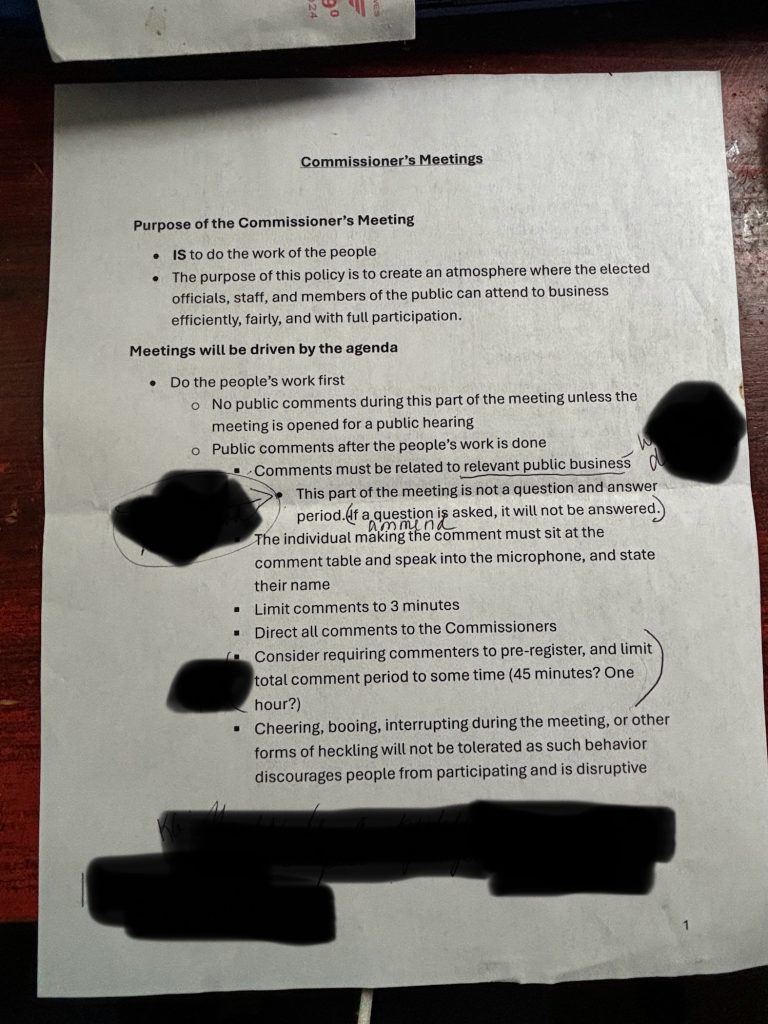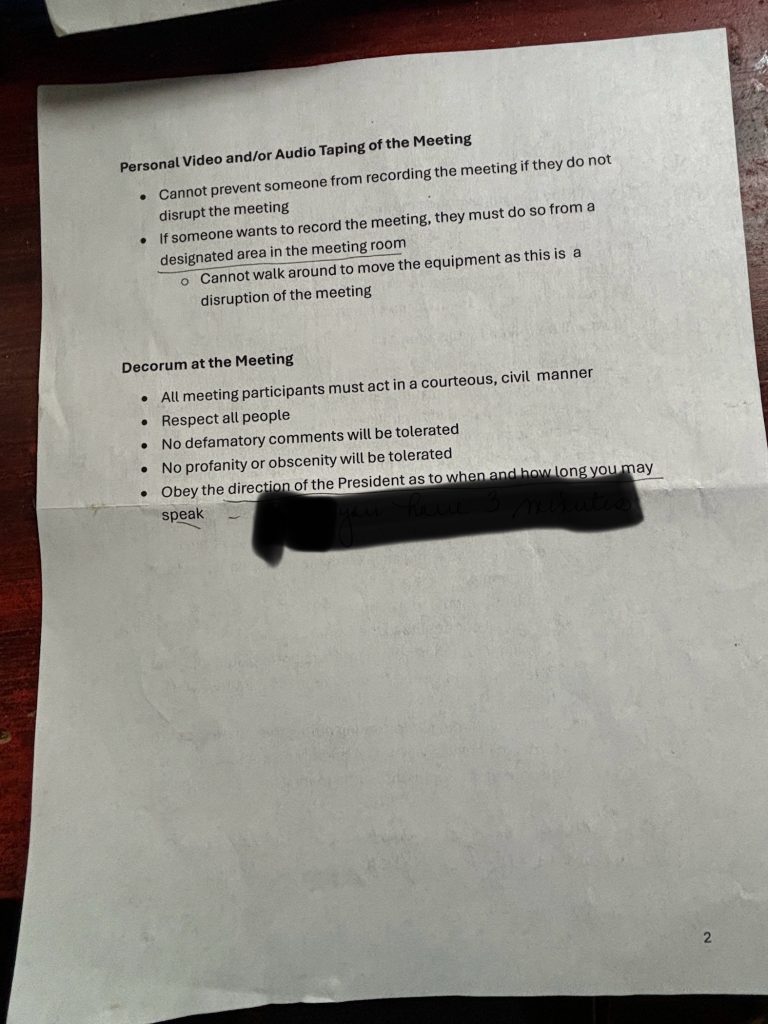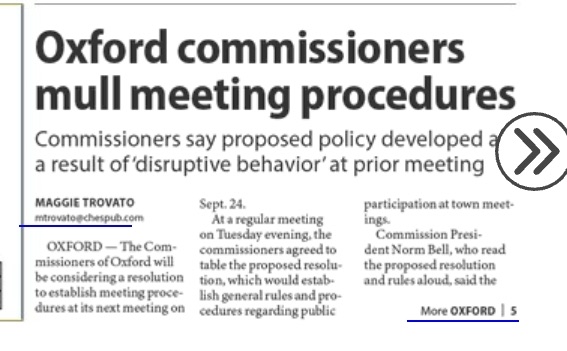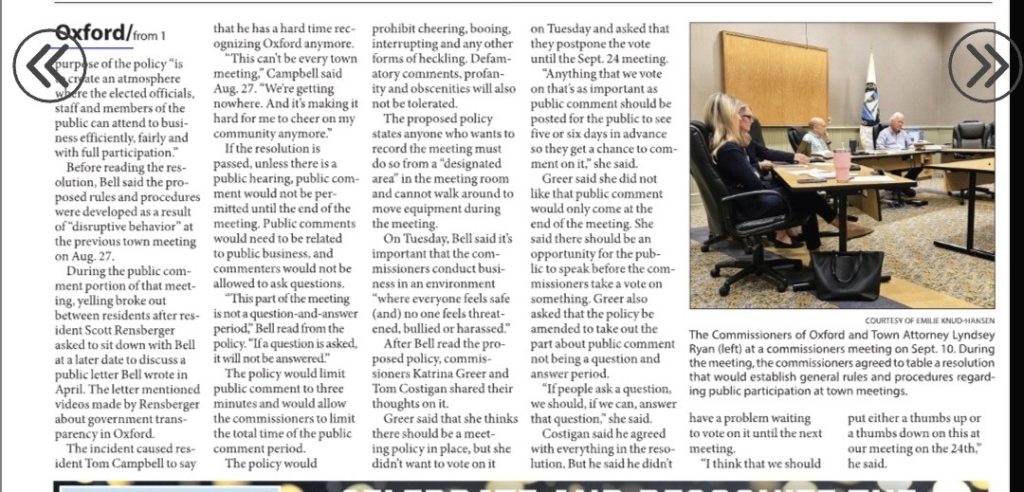
Please Follow us on Gab, Minds, Telegram, Rumble, GETTR, Truth Social, Twitter
We keep hearing about from small town after small town how "things are just not right" and that the people feel they are not in charge. Whether towns have mayors or councils or commissioners, it seems that those who govern feel inclined NOT to listen to the people they supposedly work for.
Two Maryland Eastern Shore Towns, Ridgely and Oxford, are experiencing a disturbing trend where those who want to govern their towns don't want to hear from those who pay the bills. Otherwise, the two towns couldn't be more demographically different from each other.
First up, Ridgely, Maryland. A town in rural Caroline County, Maryland, Ridgely has approximately 1,600 residents. The median age of residents is 38.6 years and the median income is $62,767, well below the State Average. The median value of homes in Ridgely is approximately $236,000.
In March of 2024, the town placed its entire police department on suspension due to allegations of a whistleblower that triggered an investigation by the State of Maryland State Prosecutor's office. The allegations were about the disposal of surplus equipment including guns and cars. The investigation yielded no wrongdoing and all the suspended officers were exonerated of doing anything wrong.
Despite that, the Commissioners of Ridgely laid off all officers of the Ridgely Police Department on July 1, 2024. In a meeting Monday, September 9, the commissioners stated that they would not reinstate their police department. They have made an agreement with the Caroline County Sheriff's Department to cover the town and maintain a substation there.
Citizens of the town voiced their concerns, displeasure, and questions about the decision, to which Commissioner John Buckle said, "We're not answering no questions. I'm in charge."
Despite the fact that it appears that none of the Ridgely Town Charter was followed, that citizens cannot get any information regarding the investigation of the town police force and who instructed Commissioners to suspend the police force in the first place.
Unhappy Ridgely citizens are not taking this turn of events sitting down.
Resident Robin Martin stated, “I think we have a distrust for the commissioners of the town,” Martin said. “We’ve been way more involved in things that are happening in the town, because we don’t trust that they have our best interests at heart anymore.”
It's interesting that the citizens of Ridgely are expressing the same mistrust of town officials that residents of Oxford have voiced in the last 19 months.
Remember, Oxford and Ridgely are two towns that are amazingly different. Oxford has approximately 600 residents. The median age is 64.8 years, and the median income is $74,450. That number is somewhat deceptive since many residents in Oxford are retired. However, Oxford is an extremely wealthy town with median home value at $700,886. The median home value is $398,000 for the State of Maryland.
Yet, both towns seem to be suffering from a similar malady. Non-transparent, unresponsive local government who the citizens don't trust.
Oxford had been subject to very "lively" meetings since February of 2023 when long time Police Chief Patrick Maxwell suddenly retired under suspect circumstances. That retirement exposed many problems in the town including nepotism in hiring, unsound financial practices, deficit spending and a totalitarian town government headed by unresponsive town Commissioners and a one woman show in the town office, the town manager. It triggered the placement of the loser in an election for Town Commissioner prior to the winner being sworn in. People began to see that things weren't quite right in Oxford.
The Town manager, Cheryl Lewis, retired in June, but not before she personally interviewed and hired two replacements in the town office and a possible replacement for her who turned out to have a past of indecent exposure to children. That replacement left after being in town three days. The other two employees still remain.
An election in July led to the seating of a new Town Commissioner, Norm Bell, who was suddenly and strangely immediately elected the President of the Commissioners despite having no experience as a commissioner.
Citizens had hope that his campaign promises of openness would prevail. Recent events have shown those promises may be merely campaign strategy.
On Tuesday, September 10th, the Commissioners revealed some ideas for how they would stifle free speech and citizen input at meetings going forward. They did this after the August 27th town meeting which nearly ended in a fight when one attendee rudely and loudly interrupted another citizen, Scott Rensberger, while he was following the rules, raising his hand, identifying himself and asking Commissioner Bell a question. Rensberger was not disruptive. The video can be found here:
Stream Video - Town Hall Streams
The two-page document of proposed meeting changes is included here:


Here is the response I sent to the Oxford Commissioners regarding these ideas:
Good morning,
I am commenting on your recent proposal to change meeting procedures.
First, I think we need to remember that the town meetings are NOT for the Commissioners but for the residents and taxpayers so we can interact with our Commissioners and other officials. Even though these proposed procedures are said to be designed to help do "the people's business", it seems that the procedures listed in the document actually don't serve that purpose.
I'll address these point by point.
MEETINGS WILL BE DRIVEN BY THE AGENDA: This part of the meeting is stated as a time when Commissioners will address the agenda, but NO public comment is heard.
This is not only counterproductive but indicates that Commissioners wish to conduct what is called "the people's business" without the people. What is the point of denying public comment, ie the comments of "the people" during this portion of the meeting? Wouldn't it be a good idea to allow people to ask questions and ask for clarification of proposals BEFORE commissioners decide what to do with them or while issues are on the table? For example, in last night's meeting a business owner wanted to ask about a presentation regarding the "hotel tax." He was immediately shut down and therefore unable to ask questions of the presenter. The presenter left the meeting and I assume this business owner will now have to ask his questions elsewhere without the commissioners knowing what they were and hearing any concerns he has. The tax would directly affect his business as he is the owner of a historic hotel in Oxford.
Also, who gets to decide if a comment is "related to relevant public business"? Is that the President of the Commissioners? If so ,why does he get to decide that when all commissioners are of equal power? How do we define relevant in this case? Something that may not seem relevant to "public business" when first stated may actually have great relevance when fully stated.
What is the point of NOT ANSWERING questions during any part of the meeting? I don't know if the Commissioners realize it, but part of having these meetings is so Commissioners and staff CAN and DO answer questions and citizens can interact with public officials regarding those answers. This suggestion to not answer questions is dismissive and indicates an attitude among the Commissioners that citizens' questions are irrelevant and not to be answered. Commissioners and staff SERVE the interest of the people. Let's not forget that.
Isn't this dismissive and defensive attitude what has gotten Oxford into a lot of trouble recently?
If Commissioners don't have the information to answer the question, they can say so. If they want to investigate the answer to the question further, they can say so. But to merely sit there stone faced and silent in the face of questions is not what "the people's business" should look like. We are the residents/taxpayers and have a right to ask questions and get answers. This is one of the reasons why the town has an overwhelming number of Public Information Act requests.
CONSIDER REQUIRING COMMENTERS TO PRE-REGISTER AND LIMIT TOTAL COMMENT PERIOD TO A CERTAIN AMOUNT OF TIME:
I don't know where this idea came from, but it is another indicator that the Commissioners don't want the people involved in "the people's business."
When people have to "pre-register" it cuts out people who may be in attendance at a meeting and hear something that makes them want to comment or ask a question. It also will allow the town clerk to "cull" registrants and make sure that only certain people get through to comment at meetings if there are many on the list whose comments may exceed the proposed time limit. I have seen it happen in other public meetings in the past where certain people don't make the "cut" to speak at a meeting because the powers that be don't want to hear them. I have also seen officials "stack the deck" in their favor through this practice.
Limiting the amount of time for public comment also flies in the face of the supposed desire to want to do "the people's business." Some issues may require much more time depending on the number of people who wish to comment. Which people get preference in a time limited comment session, those who get selected by the President of the Commissioners first? This sets up a scenario for favoritism and exclusion.
Certainly, none of us want to sit there for hours of public comment. However, sometimes that is what it takes for "the people's business" to get done. Either the Commissioners want to do "the people's business" or they don't.
DECORUM AT THE MEETING: The last sentence in the suggestions is chilling. "Obey the directions of the President as to when and how long you should speak" is in direct contradiction to the three-minute limit already proposed. This could also be subject to favoritism. If the President doesn't like the speaker, he can just demand they stop speaking when he hears criticism he doesn't like.
(Incidentally, I thought it was improper Monday night for the President to decide on the fly that speakers in one part of the meeting had "1 minute." Why? The President is not a king and town meetings are not a "court." Why not let those people have the standard three minutes? It was a bad look.)
The Commissioners have over complicated the problem of public participation in meetings. It's very simple. Treat people equally. Listen to ALL citizens, not just the ones you favor.
This should be done civilly and appropriately and if a citizen crosses the line, deal with it then. If a meeting runs long, then you know you have an issue that affects many people and that needs to be carefully considered.
The job of Commissioner is a difficult one. However, YOU chose to seek this office. No one forced you. If you are not up to allowing the people to voice their opinions and exercise their freedom of speech in meetings, you should resign. Plain and simple.
Again, these are not meetings for the Commissioners, they are meetings for the people of this town. The "people's business" is sometimes difficult and messy, but it cannot be done by suppressing public comment and interaction.
Sincerely,
Jan Greenhawk
While the Oxford proposal for meeting procedures is nicely written, it's actually just a more eloquent wordy version of what Ridgely Commissioner John Buckle said, "We're not answering no questions. I'm in charge."
Both John Buckle's statement and the proposal for Oxford meeting procedures show citizens the same thing; our local governments have forgotten that citizens and taxpayers foot the bill for town business and that they, the elected and hired officials of town, represent and work for us. And, by the way, Oxford has addressed citizen input at meetings in a section of the Town's charter:
Section C3-4. Meetings of the Commission
All meeting [meetings] of the Commissioners shall be open to the public, and the rules of the Commissioners shall provide that residents of the Town shall have a reasonable opportunity to be heard at any meeting in regard to any municipal question.
Sadly, it seems another reading of the town charter may be needed as Commissioners don't appear to want to follow it.
Ridgely and Oxford are just two small towns in Maryland, but sadly, they show the attitude of many small towns in our country. Wake up America and take back your small towns!
To the citizens of Ridgely, we stand with you in your quest to be heard!
Star Democrat story regarding the Ridgely meeting:
https://stardem-md.newsmemory.com/?publink=0243fc094_134d433
SPECIAL ADDITION: Once again, Maggie Trovato and the Star Democrat act as PRESS RELEASE WRITER for the town as she wrote this article about what happened in the September 10th Oxford
meeting. Question is, do they still teach objective journalism in college? Judging by the STAR DEMOCRAT, they don't:


Similar Stories:
Brilliant work Jan. Thank you for your dedication to helping to shine a light on the truth–the citizens of Oxford are determined to straighten things out and your information is invaluable.
Thank you!!!
I strongly urge Oxford citizens who feel that there is an attempt to stifle us-to write a letter to the commissioners, and remember to ask for it to be officially entered into the record. Unless requested there seems to be a problem with ALL letters being acknowledged.
Absolutely! Citizens need to write and demand letters be entered into the minutes of the Commissioner's meetings.